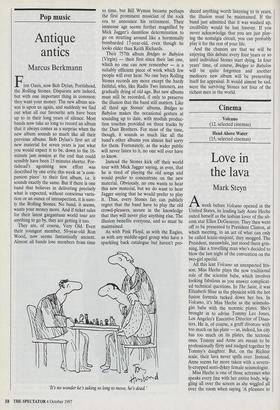Cinema
Volcano (12, selected cinemas) Head Above Water (15, selected cinemas)
Love in the lava
Mark Steyn
Aweek before Volcano opened in the United States, its leading lady Anne Heche outed herself as the lesbian lover of the sit- com star Ellen DeGeneres. They then went off to be presented to President Clinton, at which meeting, in an act of what can only be called lezzie-majeste, they snogged. The President, meanwhile, just stood there grin- ning, like a travelling man who's decided to blow the last night of the convention on the two-girl special.
All this lent Volcano an unexpected fris- son. Miss Heche plays the now traditional role of the scientist babe, which involves looking fabulous as you answer complicat- ed technical questions. In The Saint, it was Elizabeth Shue as the physicist with the hot fusion formula tucked down her bra. In Volcano, it's Miss Heche as the seismolo- gist babe with the tectonic plates. She's brought in to advise Tommy Lee Jones, Los Angeles's Executive Director of Disas- ters. He is, of course, a gruff divorcee with too much on his plate — as, indeed, his city has too much on its plates, the tectonic ones. Tommy and Anne are meant to be professionally flirty and nudged together by Tommy's daughter. But, on the Richter scale, their lava never spills over. Instead, Anne seems far more taken with a severe- ly-cropped semi-dykey female seismologist.
Miss Heche is one of those actresses who speaks every line with her entire body, wig- gling all over the screen as she wiggled all over the room when saying 'A pleasure to meet you, Mr President' to Bill Clinton. But it's noticeable that she saves most of her warmth and emotion for her girlfriend rather than Tommy Lee Jones. Possibly this is just some retrospective projected les- bian fantasy on my part, but in a film as numbingly formulaic as this bring-your- own-subtext isn't a bad policy. Alas, the girlfriend is the first to go, swallowed up by a giant eruption of lava while she and Anne are taking readings in a subway tunnel early one morning.
After that, things settle down quickly. The volcano of Volcano isn't anything as straightforward as, say, Montseriat's. For a start, it's underground and so comes to life mainly by bubbling up through the La Brea tar pits and the city's underground transit System, the construction of which we're told was an act of monumental environ- mental 'arrogance'. That's true — and it's all so unnecessary: after all, it would only take half a dozen studio vice-presidents' stretch limos to match the capacity of the entire LA subway.
That's not the only lesson Volcano has to impart. As the lava spills through the streets, there are tensions between racist White cops and African-American commu- nity leaders. The film itself, mind you, is admirably non-racist. The inevitable looters represent all the city's ethnic groups with a punctiliousness never quite achieved by real riots. As they come together against the common enemy, it takes a small child to point out the profound truth: 'Look,' he says, 'everybody looks the same.' And, yes, they do. No black, no white, no yellow. Now, everyone's faces are grey, because they're covered in volcanic ash. If only we could have a volcanic eruption every day. As the Beatles sang back in the summer of '68, all you need is lava.
Another blonde of the moment, Cameron Diaz, stars in Jim Wilson's Head Above Water, a position hardly anyone in the cast manages to hold, instead drowning in the sea of disjointed dialogue, non-char- acterisation and lame situations all round. Miss Diaz stars as the young wife of Harvey Keitel, living on an isolated island off the coast. A childhood boyfriend helps look after the place; another old beau turns up, too. Soon there's a body in the basement, and the problem is how to dispose of it.
Keitel no longer does a film a week, as he did a couple of years ago. But, if he's become more discriminating, you'd never know it from his performance here. I think the film is aiming for a kind of black come- dy drollness, but Keitel has absolutely no lightness of touch, and his double-takes and facial exaggerations and stage drunk routines are painful to watch. There are only five players in the entire picture, but somehow they're all truly awful. Only towards the end, when the very landscape — or anyway a gazebo and certain equip- m. ent seems to rise up and throttle the life out of the actors, does the film come close to achieving any true comedic grace.











































































 Previous page
Previous page